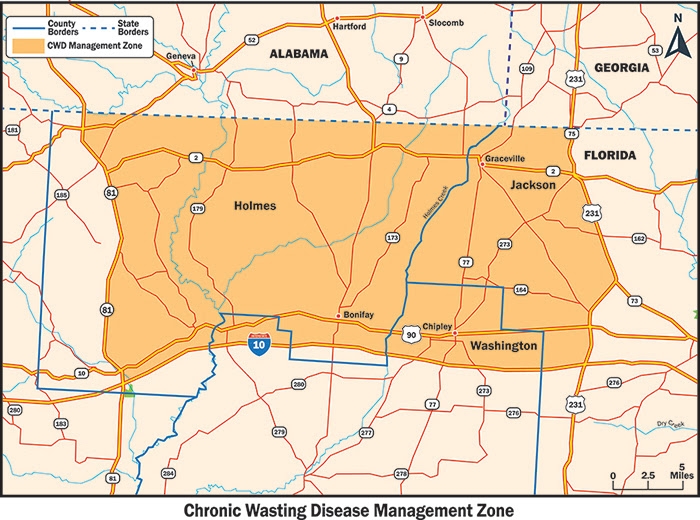Panhandle's Zone D archery/crossbow deer season started Oct. 26, with new CWD regulations
Florida Fish and Wildlife Conservation Commission (FWC)
Archery and crossbow deer seasons in Zone D in Florida's Panhandle area began Oct. 26, 2024, on lands outside the wildlife management area system, officially kicking off deer season in the zone.
In June 2023, the Florida Fish and Wildlife Conservation Commission (FWC) confirmed the first known case of chronic wasting disease (CWD) in a white-tailed deer in Florida. Since then, no additional positive cases have been detected. In response, the FWC established a CWD Management Zone along with special regulations for that area and additional hunting rules in Zone D. These measures aim to increase sampling and help protect Florida’s white-tailed deer herd by reducing the potential spread of CWD within the CWD Management Zone and to other parts of the state.
“Florida’s early detection puts us in a best-case scenario for CWD management, as a smaller outbreak is more realistic to contain,” said the FWC’s CWD Surveillance Coordinator, James Kelly. “Hunters are our first line of defense in managing this disease by voluntarily submitting samples for testing and following these new regulations. Each sample helps us track the spread of the disease and informs our strategies to manage it effectively.”
Increased Antlerless Deer Opportunities in Deer Management Unit D2
The take of antlerless deer is allowed during the entire deer season in DMU D2, except in wildlife management areas (WMAs).
Up to three antlerless deer, as part of the statewide annual bag limit of five, may be taken in DMU D2, except in wildlife management areas.
Feeding and Carcass Transport Restrictions within the CWD Management Zone
Feeding deer (including the placement of feed, grain and salt/mineral products) within the CWD Management Zone is now allowed but only during the deer hunting season.
The export of whole carcasses and high-risk parts originating from the CWD Management Zone is prohibited. Hunters may export deboned meat; finished taxidermy mounts; clean hides and antlers; and skulls, skull caps and teeth if all soft tissue has been removed.
The FWC recommends that hunters dispose of deer carcasses and unwanted parts in one of several ways:
1) Leave everything except deboned meat, clean hides and antlers, and clean skulls and skullcaps on the property where the deer was harvested. This reduces the unintentional spread of CWD into new areas.
2) Double bag and dispose of unwanted parts in household garbage to be collected by your municipal waste service or
3) Dispose of unwanted parts in a lined landfill.
CWD Testing
The Centers for Disease Control and Prevention recommends that hunters harvesting deer from areas with CWD get their deer tested for CWD before consuming the meat. It is not recommended to consume meat from animals that test positive for CWD or from any sick animal.
The FWC offers no-cost CWD testing throughout the deer hunting season (skull cap and antlers can be removed and kept). For sampling locations, visit MyFWC.com/CWD.
Given the limited number of approved CWD testing laboratories and the large quantity of samples submitted throughout the country, we ask that hunters allow up to 30 days for results to be processed. Test results for harvested deer can be viewed at MyFWC.com/CWDResults.
Hunters can visit MyFWC.com/CWD to find more information about CWD, locate sample drop-off locations and learn more about these new regulations.
